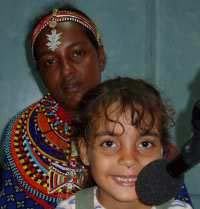|
Intermix.org.uk is a website for the benefit
of mixed-race families, individuals and anyone who feels they have a multiracial
identity and want to join us. Our mission is to offer a view of the mixed-race experience, highlighting icons, film, books, poetry, parenting techniques, celebrities, real lives and much more. Our online forums are a great place to meet others, ask questions, voice your opinions and keep in touch. Sign up for our monthly newsletter and delve into our pages. Want to join in? Become an Intermix member to take part: |
Our Boys Behaving Badly
 British soldiers accused of raping tribeswomen
British soldiers accused of raping tribeswomen
Life for many mixed-Race individuals is hard enough but for Maxwel Keisa
and others like him, things are somewhat tougher. Maxwel was born after his mother a Kenyan,
was allegedly raped by a British soldier camped in the Dol Dol Ranges of Kenya.
Maxwel is 24 but the alleged rape of Kenyan women in the area has been going on for
thirty years. Many of these women are shunned by their respective tribes after the rapes
and the mixed-race children born of these assaults are never accepted as part of their
communities because of their father’s backgrounds.
Since his childhood, Maxwel has been constantly subjected to discrimination and has even
attempted suicide. 'Because of my British background, ever since I was a young boy, my
friends ran away from me because their parents warned, or even punished them, for playing
with a foreigner,' he said. Now a man, Maxwell finds that his mixed-race parentage
prevents him from getting a job.
The trauma these women and children have suffered as a result of the alledged rapes is
heightened by the abandonment they receive from their own communities. Elders in the community
said that Maxwel and his colleagues will never be treated as an equal partner in the community
because his patrimonial background did not match the Maasai pattern of life. Samoei ole Kitulal,
a Maasai headsman, said his deeply conservative community is awash with such mixed-race people
and that they receive similar treatment 'because they are not part of us'.
Johnson Ole Kaunga, the director of Indigenous Movement for Peace Advancement and Conflict Transformation (IMPACT) says, 'the alledged rapes have been taking place since the 1960's.'
Having gathered their stories Kaunga says, 'you will see women whose lives have been shattered.
You will meet women who are social misfits after they have been raped.
Asked why he had picked up the rape issue, Kaunga says he wants to bring out these cases so that
the British authorities can know what kind of track records their soldiers set when they train in
Kenya. 'They should know that a lot of bad things go with it when they come for training here.
We want them to take Kenyan’s seriously, as they do with their own citizens. We want them to respect the
culture and the lifestyle of the people they meet.'
You cannot hide a mixed-race child, not in a village of dark skinned people. There are also
those women who may have been raped and not got pregnant. The high number of women who alledge
rape and the large number of mixed-race children born to these women to support their story does
make you wonder what the implications of this are. Do some British soldiers have such little value
for the lives of African women?
The legal battle for these Kenyan tribeswomen is being fought by London-based lawyer Martyn Day who was approached
by a handful of Massai women back in 2001 claiming they had been raped by British soldiers.
Since then numbers have increased, although it is thought that a percentage of women will never
come forward and indeed there are some that have confessed to aborting their pregnancies because
they could not bear the shame it would bring on themselves and their families.
The plight of the Kenyan tribeswomen was also the subject of an ITV Tonight special screened on Wednesday March 5 at 11pm entitled Our Boys Behaving Badly. Presenter Fiona Foster revealed how modern DNA technology could be used to identify the fathers. Whether they were guilty of rape or not would then be up to a court to decide.
What do you think of this story? Click here to let us know your views in the forum:
